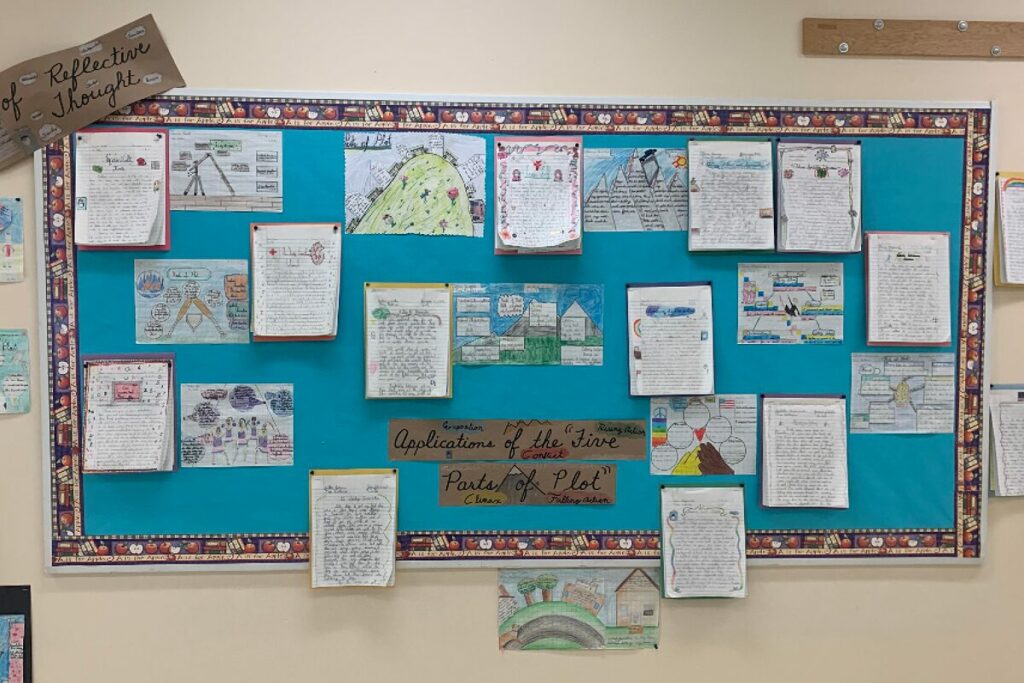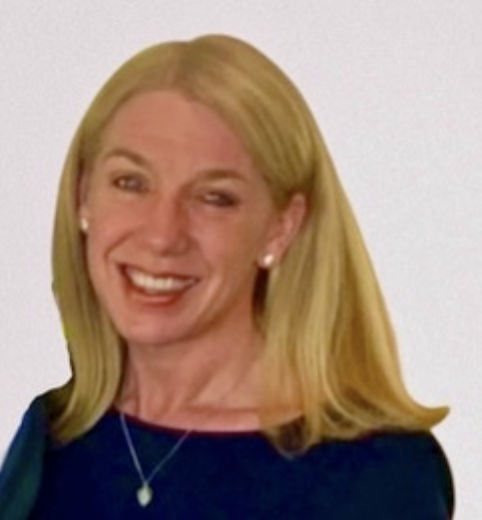As I work to grow and develop my learning environment, I’m going to continue asking more questions of my learners, trusting that what will emerge will only deepen my practice and passion.
Michelle Halloran, Cofounder of S.A.G.E.
As facilitators, there are insights to be learned when we least expect them. There are no boundaries to how, where or when individuals connect and harness the power to influence each other. By asking a simple question to two learners, I realized this truth. Through just this simple exchange, I gained valuable insights as a facilitator about how powerful the gift of time and space to think can be in a learning environment.
A bit of back story, within our learning environment, our fifth graders have been composing memoirs about a time where they learned a life lesson from a challenge they overcame. Throughout the process of drafting, learners were expected to align their personal narrative with the five parts of plot and select attributes that supported them. While reflecting on their journey, learners were encouraged to make connections to other texts or experiences in their lives.
One day recently, I was walking with a small group of young ladies at recess, and posed a simple question, “In what ways did you grow as writers this morning?” It sparked a moving and inspiring twenty-minute chat. When implementing a Socratic approach, as we do in our learning environment, conversations and experiences can shift and take unexpected paths, and this conversation most certainly did. I want to share with you the insights I gained from this exchange.
Reflections from Learners—Time to Think
We’ve spent more time on this inquiry than normal, and I’m not even quite sure we are near “the end.” However, this is not particularly unusual for our environment. We know the process of learning is cyclical, meaning we are continuously building upon what we’ve constructed, leading into the next inquiry. The amount of time each learner needs to dig deeper into their inner thoughts certainly varies, and we try to allow for that variance without someone being “behind” or “ahead.” Throughout this experience, we were actively engaged in thinking deeply about our own personal stories and connections—giving students space to consider what life lesson they most wanted to delve into, rather than just expecting that they’d work with the first one that came to mind.
While I certainly had been observing this as the learning facilitator, I wasn’t sure my students were. To my surprise, the gift of time and of having the space to think expansively was not only noticed by the students but was also appreciated.
That simple question, “In what ways did you grow?” sparked so much learning for me as a facilitator.
Michelle Halloran, Cofounder of S.A.G.E.
In response to my inquiry at recess, the girls eagerly shared their excitement about the writing pieces they were composing. They spoke about the benefits of having a significant amount of time to think, write, edit, and depict their thoughts. They commented on how important it was that they were able to choose the central ideas for their unique memoirs. With all their enthusiasm, I was taken back when they admitted that in the past they never really enjoyed reading or writing. In fact, one of the girls told me she never before considered herself to be smart or very good at writing.
Hearing this disheartened me as I thought about how critical the primary years are in connection to building strong foundations and fostering a love for learning. When asked why they had a negative view of academics, their answers were very clear and direct. It was simply because they were never given the time to think through concepts and were always told what to read or write, along with how to address the task at hand.
Reflections from Learners—Time to Talk
Recognizing the significance of these insights, I asked that they share more. They shared their dislike of the practice of having classes sitting silently with a book, known as “Independent Reading,” without the opportunity to talk about what they read.
In contrast, they reminisced about the Socratic discussions they’d had with this opportunity that led to deep learning experiences. It was clear that prior to being in a learner-centered environment where thinking is made visible, they had only been exposed to content through a set scope and sequence that dictated the course of action.
Rather than digging deep into concepts and making those long-term neural connections needed for building strong foundations of growth, much of what they experienced in the past was at a surface level. They rarely applied thinking strategies that personally connected them to the experience itself. I can only imagine the independent thought and resiliency we would observe if they were immersed in this “slow and steady” approach from the very first time they entered school.
To go beyond that possibility, what if it wasn’t a school they were entering but, rather, fluid spaces of inquiry where ideas were expressed and built upon? Where there was an acceptance and valuing of different viewpoints and thoughts? It has been our experience that endless possibilities reside in one’s ability to self-reflect and go deeper into themselves as meaning is uncovered. For these learners, they’d experienced a shift in thinking and a newly positive mindset about learning, which has been beyond exciting to witness.
It became evident that the deeper they went into the experience of reflecting and did more inquiry into themselves, the further they went in taking ownership over the process of making connections and constructing. Upon realization of this, I immediately found myself thinking about how this shift can be sustained when they enter sixth grade and transition from the environment they have been thriving in.
Reflections as a Facilitator
As this recess conversation came to an end, I thanked the learners for taking the time to walk and talk with me. I told them my true passion is in learning as much as I can about what intrinsically motivates learners. Hearing their thoughts helped me better understand the necessary components of an evolutionary environment that tailors learning opportunities in ways that align with each emergent thinker.
As facilitators committed to each learner’s individual growth, and the collective well-being of our communities, this experience is one of many that confirmed for me (and my broader learning environment) the value of bringing to life a progressive vision. In cultivating fluid spaces of inquiry that support each contributing individual in meeting their full potential, we empower learners to take ownership and pride over their accomplishments. By affording them time to think and choice in making their thoughts visible, we open the door for intrinsic motivation to take hold.
By engaging in this conversation, it made me reflect and think about how to infuse more of what I learned into experiences in my environment. A few ideas I would like to expand upon include:
- The time necessary for learners to be metacognitive thinkers as they build understanding and make long-term connections.
- Individualized learning opportunities aligned with each learner’s academic, social, and developmental level of growth.
- Competency-based model system honoring how learning happens naturally.
- Opportunities for communication and collaboration with facilitators, learners, families, and communities.
- Choice and time to engage deeply in interdisciplinary stewardship initiatives.
- Interactions within reciprocal feedback loops between all contributing members.
- Trusted relationships that allow for resiliency to develop by embracing mistakes.
That simple question, “In what ways did you grow?” sparked so much learning for me as a facilitator. It excited me and confirmed the factors I’ve always believed to be central to the process of learning—time and space to think deeply. As I work to grow and develop my learning environment, I’m going to continue asking more questions of my learners, trusting that what will emerge will only deepen my practice and passion. I would encourage you to take on this challenge with me.

